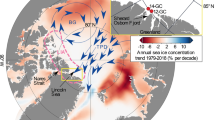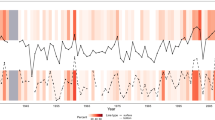Abstract
MR. A. J. LEE has recently commented1 on my paper dealing with variations of sea surface temperature in coastal waters of the British Isles. He points out that I made no mention of the part played by currents in determining the winter pattern of sea surface temperature. I was, however, primarily concerned with the shape of the isotherm patterns. The presence of the relatively shallow water of the Dogger Bank area will, in itself, ensure that the pattern will consist of two tongues, although the level of temperature of these tongues will be largely determined by the strength of the currents mentioned by Mr. Lee.
This is a preview of subscription content, access via your institution
Access options
Subscribe to this journal
Receive 51 print issues and online access
$199.00 per year
only $3.90 per issue
Buy this article
- Purchase on Springer Link
- Instant access to full article PDF
Prices may be subject to local taxes which are calculated during checkout
Similar content being viewed by others
References
Nature, 190, 1164 (1961).
Author information
Authors and Affiliations
Rights and permissions
About this article
Cite this article
LUMB, F. Sea Surface Temperature in Coastal Waters of the British Isles. Nature 192, 153–154 (1961). https://doi.org/10.1038/192153a0
Issue Date:
DOI: https://doi.org/10.1038/192153a0
Comments
By submitting a comment you agree to abide by our Terms and Community Guidelines. If you find something abusive or that does not comply with our terms or guidelines please flag it as inappropriate.



